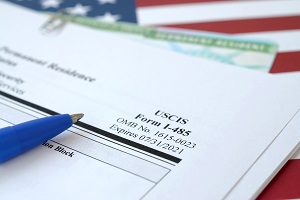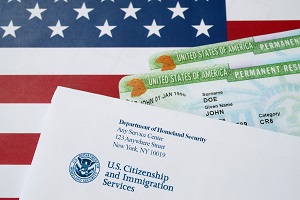Can I Petition My Brother As A U.S. Citizen?
”El Show Sin Fronteras”
Spanish Video Above Translated In English Below
Citizenship & Immigrants In The U.S.
If you are a U.S. citizen, you may be eligible for certain members of your family to obtain permanent residency. For this purpose, Form I-130 establishes that a valid family relationship exists between a U.S. citizen or Green Card holder and a Green Card applicant.
Current U.S. immigration law allows U.S. citizens to petition for siblings, spouses, parents, and children. The requirements for you to petition for a sibling who is a U.S. citizen depend on whether your sibling is located inside or outside the U.S.
Each year, the USCIS immigration agency processes more than 480,000 family-based Visas. This is one of the most popular options to become a resident, but which family members can you petition? In what cases can I ask my brother? Is it a lengthy process?

Can I File A Family Petition For A Sibling Or Step-Sibling?
Only U.S. citizens may petition for siblings, permanent residents may not.
The difference between a permanent resident and a citizen is that a citizen may petition for siblings, parents, and children who are married.
A U.S. citizen born in the U.S. or became a citizen by the naturalization process, you may petition for your siblings, half-siblings, and also your step-siblings, but the law requires that to petition for a step-sibling, the marriage or marriage between the father and stepmother must have occurred before the petitioner reached 18 years of age.
It is necessary to qualify as step-siblings to make use of that part of the law.
Only a U.S. citizen may petition for their sibling, half-sibling, or step-sibling.
How Long Is The Waiting Time To Request A Sibling As A Citizen?
There are only certain Visas available each year and they only give part of the Visa to siblings of citizens, this is something that would have to change in immigration reform.
All those who qualify should register in that category because if we have an immigration reform that is separate from the law, that category of siblings will cancel it, then, all those who are already registered will be able to complete the process.
Even if the wait is long, it’s worth registering in this category now, because we don’t know if it will continue or survive a change in immigration laws.
To find out about the waiting time for each category of a family member, such as a child of a permanent resident, parent of a citizen, or child of a citizen, we need to review the Visa Bulletin that is published each month with the waiting time for each category.
The category for siblings, the last line, is the F4 category. We have first the group for those who do not live in China, India, Mexico, or the Philippines because these four countries have their waiting times.

The longest wait is for Mexicans. They are currently processing cases that were registered in June 2000, so 22 years have passed already.
The wait for Filipinos has been in effect since 2002, for Indians since 2005, for China since 2007, and for the rest of the world since 2007.
It’s a little less for those not in Mexico but approximately two decades.
This doesn’t mean that the wait is going to be 22 years because it does move sometimes in real-time, sometimes in double time, it goes the other way around.
Actually, the truth is that no one knows how long they will have to wait, what we can say is that cases are now being processed for Mexicans who are siblings of citizens and were registered 22 years ago.
Is There An Age Limit To Be Able To Order Or Be Ordered?
There is a limit. To be a petitioner, a citizen must be 21 years of age but may petition for a sibling who is a minor.
The age of the beneficiary doesn’t matter, for example, when we have a citizen here in the United States. and they have their parents and their little brother in Mexico, and their little brother is 10 years old, the citizen who lives here, could petition their father directly as a citizen’s father because he is over 21 years old.
You can also ask your mother directly as the citizen’s mother, but unfortunately, the law does not include derivatives in this type of procedure.
The petitioner’s parents cannot automatically include their child who is 10 years old, that is a big problem that occurs.
There are two options, first, the citizen could petition for their father, mother, and brother, but the parents will be able to adjust their immigration status immediately because they are immediate relatives of the citizen, and there’s no waiting for that deadline.
They will be able to finish the process within a year and a half to two years and come to the United States with permanent residency.
The child is still going to be waiting for their priority date for 20 years, so, it’s not a good option.
The other option is that parents can petition for their minor child when they obtain their permanent residency, and the wait for the Visa Bulletin for children of permanent residents who are minors is three years.
Unfortunately, these families are going to have to think about family separation if they are all seeking to adjust their immigration status in the United States.
For example, if the citizen petitions their mother, she can petition the child, and the child can come with the father usually in three years.
These are not good options, and that’s the other problem we find in that part of the law, but it’s something that a lot of families have to think about if they find themselves in those problems.
Can I Ask My Brother-In-Law?
In the Family Petition category, which is the I-130 form, there are derivatives. If you ask for your brother and he is married and has two children, the whole family will be included in this process.
We can fix them before those kids turn 20 or 21, but those are other problems for the future.
In resume, yes, in that category of siblings we can include brother-in-law and children.
In the case of whether this applies to adopted siblings, adoption laws with immigration will likely affect whether a sibling could petition for an adopted sibling.
What will apply are siblings, half-siblings, and step-siblings, if the parents were married before the petitioner turned 18 years old.
Sibling Beneficiaries: Is It Better To Be Requested By Your Spouse Or Sibling Citizens?
It is 100 percent better to be petitioned by your spouse, because if it is a bona fide marriage, being the spouse of a U.S. citizen makes you an immediate relative, and you do not have to wait for the priority date on the Visa Bulletin.
That person can adjust their immigration status quickly, but obviously you have to qualify depending on their immigration history, their criminal history, and things like that.
If you qualify and everything is in order, it would always be better to adjust a migratory status for a marriage rather than a sibling, because the wait for siblings is very long.
With An Approved U Visa Can I Apply For Residency For My Citizen Spouse?
This depends a lot on the particular history of the person because if for example, you are adjusting your immigration status on behalf of your spouse, and you entered without a Visa, even though you already have a U Visa, you will often be able to enter without a U Visa.
Normally, you may be arranged through the Consular Process and request a waiver for unauthorized presence for the time in the United States before receiving the Visa.
It is possible that although the wait for residency with the U Visa is three years, it would be the most convenient, and also, not have to ask for a waiver and leave to the Consulate.

For any type of immigration situation, we must consult directly to investigate its history.
We believe that it will be easier to arrange for the U Visa because, the waiver we do to receive the U Visa applies for permanent residency, so another waiver is not often needed.
The U Visa process is already done on that side, and it could be more complicated if the person changes the strategy to a family residence.
How Do You Adjust Your Parents As A Citizen?
If a citizen who is over 21 years old is ready to petition their parents, we need to investigate the history of the parents, if they are here in the United States, we need to know if they are here, how they entered, how many times they have entered, and how they have been seized if it has occurred.
If the case is simple (if the parents are outside the United States) we can start the Consular Process and finish with an appointment at the embassy of the Consulate in their country of origin, and in that way, they can come with their permanent residency.
If they are here in the U.S. but they entered with a Visa, we can do an adjustment of status, but things can be a little more complicated if they carry entries without a Visa, because it is possible that they are going to have bars or that we have to waiver them.
Yes, it is possible, but a child cannot forgive a parent, so they need more relatives, such as spouses or their parents.
Family Petitions Lost Before The 2000s
There is a process where we can ask for the registered file of a name, for example, the name of an aunt that was requested in the 90s but her family does not know what happened with that case.
This process is called FOIA and we can submit a request to obtain such a file. Often, it comes with a notice of case approval, and that we can use to adjust the beneficiary’s immigration status after so many years of waiting.
Those are our favorite types of cases when we can fix people who have been waiting for so long and after finding the important document they can adjust their immigration status without a problem.
If you have further questions about the exam, your sibling beneficiary, or your specific case, you may contact us at (855) 502-0555. After a brief 10-minute evaluation of your case over the phone, we will let you know what options you have. You can also follow us on our social networks so you don’t miss our weekly broadcasts on Facebook, YouTube, and Twitch.
Frequently Asked Questions About Siblings & American Citizenship
Contact A U.S. Immigration Attorney Today!
Categories
How To Find Us
What Our Clients Say
“This Lawfirm is great, very professional and helpful. I love that they are always in communication and always available for when you have questions . 100% recommended by me and my family. Thank you Lincoln-Goldfinch Law – Abogados de Inmigración”





